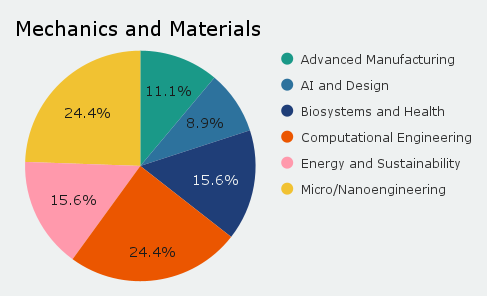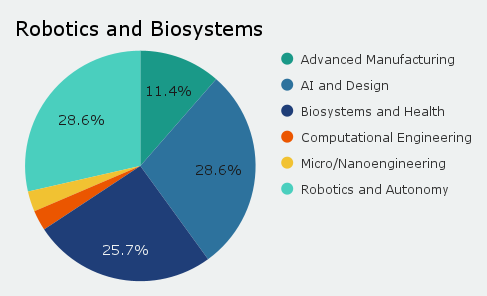Research / Areas of ResearchCore Disciplines
The foundation of research in the Mechanical Engineering Department is built across three core disciplines, which broadly define our research strengths.
Jump to a Section
Design and Manufacturing
This discipline integrates predictive science; design methodologies; advanced manufacturing and surface engineering technologies; and cyber-infrastructure to innovate products, services and systems that address societal challenges and achieve environmental sustainability.
Cross-cutting Research Areas Represented in this Discipline
- AI and Design
- Advanced Manufacturing
- Biosystems and Health
- Computational Engineering
- Energy and Sustainability
- Micro/Nanoengineering
- Robotics and Autonomy

Faculty in This Discipline
Mechanics and Materials
This discipline applies fundamentals of solid and fluid mechanics from molecular to continuum scales to innovate in biomaterials, biosystems, composites, micro/nano systems, interfacial/surface engineering, thermal transport systems, nondestructive characterization, and computational methods.
Cross-cutting Research Areas Represented in this Discipline
- AI and Design
- Advanced Manufacturing
- Biosystems and Health
- Computational Engineering
- Energy and Sustainability
- Micro/Nanoengineering

Faculty in This Discipline
- Oluwaseyi Balogun
- Horacio Espinosa
- Sandip Ghosal
- Yonggang Huang
- Sinan Keten
- Sridhar Krishnaswamy
- Victor Lefèvre
- Seth Lichter
- Wing K. Liu
- Richard Lueptow
- Kenneth Park
- Neelesh Patankar
- John Rudnicki
- Gregory Wagner
Robotics and Biosystems
This discipline studies the fundamentals of dynamics, control, and robotics applied to human/machine interaction, haptics, sensors, MEMS, nanoscale medicine and systems engineering, neural engineering, neuromechanics, and rehabilitation engineering.
Cross-cutting research areas represented in this group
- AI and Design
- Advanced Manufacturing
- Biosystems and Health
- Micro/Nanoengineering
- Robotics and Autonomy

